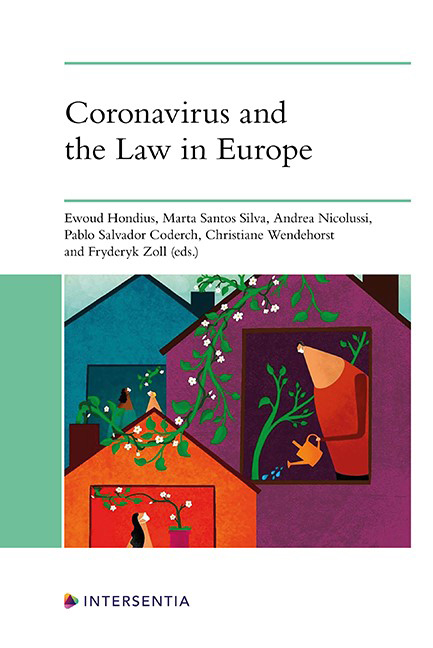Book contents
- Frontmatter
- Preface
- Contents
- List of Keywords
- List of Contributors
- PART I COVID-19 AND FUNDAMENTAL RIGHTS
- PART II STATES AGAINST THE PANDEMIC
- PART III COMPENSATION FOR COVID-19 RELATED DAMAGE
- PART IV CONTRACT LAW
- PART V CONSUMER LAW
- PART VI LABOUR AND SOCIAL LAW
- PART VII CORONAVIRUS CHANGING EUROPE
- Epilogue
- Annex: ELI Principles for the COVID-19 Crisis
- About the Editors
The Pandemic and Change of Circumstances in Italy
Published online by Cambridge University Press: 10 December 2021
- Frontmatter
- Preface
- Contents
- List of Keywords
- List of Contributors
- PART I COVID-19 AND FUNDAMENTAL RIGHTS
- PART II STATES AGAINST THE PANDEMIC
- PART III COMPENSATION FOR COVID-19 RELATED DAMAGE
- PART IV CONTRACT LAW
- PART V CONSUMER LAW
- PART VI LABOUR AND SOCIAL LAW
- PART VII CORONAVIRUS CHANGING EUROPE
- Epilogue
- Annex: ELI Principles for the COVID-19 Crisis
- About the Editors
Summary
The contribution is divided into two parts. The first describes the essential lines of the discipline of contingencies (change of circumstances in a broad sense) in Italian law with some comparisons with English common law. In particular, two subdivisions of the subject are presented. The former is the distinction between contingencies that disrupt the exchange covered by the contract in a qualitative sense and contingencies that disrupt the exchange covered by the contract in a quantitative sense. The latter is the distinction between typical contingencies, that is, legally foreseen and disciplined, and atypical contingencies, that is, not governed by the contract or by the law and which can make the fairness (equità, aequitas) criterion intervene. After this premise, the author analyses two hypotheses of lease contracts, those for commercial use and those for the residence of university off-site students, which can be considered examples of typical contingencies and atypical contingencies, respectively. The author concludes with a reference to quantitative contingencies with regard to which he takes into consideration the remedies of termination, equitable adjustment and renegotiation.
CHANGE OF CIRCUMSTANCES IN GENERAL
Of the events that have happened to man in our time, the COVID-19 pandemic is probably the most extraordinary of the last decades, not only because of the tragic effects it has had on the lives of many people, especially the most vulnerable, but also for the suspension of normal social life for, already, more than a year across much of the world. The restrictions on personal freedom imposed by the State on citizens to protect the community’s interest in health, one of the highest constitutional values (Art 32 Italian Constitution), were introduced for the first time since the birth of the Republic in 1948. It is obvious that the question of their effects on that dense web of innumerable legal relationships that had arisen in pre-pandemic daily life has emerged. For civil law, these relationships are related mainly to contracts and in particular to longterm contracts, which were affected by this extraordinary and – at least for the majority of people – unpredictable event. Events like this once again show how each contract is historically conditioned.
- Type
- Chapter
- Information
- Coronavirus and the Law in Europe , pp. 793 - 812Publisher: IntersentiaPrint publication year: 2021
- 1
- Cited by



